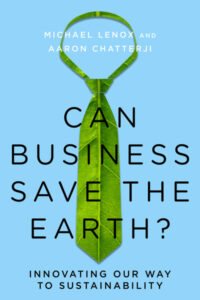 Climate change is bad for business. But can business innovate fast enough and far enough to help us avoid a climate crisis? A new book by professors Michael Lenox of the University of Virginia’s Darden School of Business and Aaron Chatterji of Duke University’s Fuqua School of Business addresses the roles that business leaders, innovators, and managers can play in innovating solutions to environmental crises. While some may debate whether environmental problems should be left to business rather than government, Lenox and Chatterji argue in Can Business Save the Earth? Innovating Our Way to Sustainability that “the economic power of the leading global companies is too powerful to ignore. Business are arguably best positioned to generate and commercialize new sustainable technologies.”
Climate change is bad for business. But can business innovate fast enough and far enough to help us avoid a climate crisis? A new book by professors Michael Lenox of the University of Virginia’s Darden School of Business and Aaron Chatterji of Duke University’s Fuqua School of Business addresses the roles that business leaders, innovators, and managers can play in innovating solutions to environmental crises. While some may debate whether environmental problems should be left to business rather than government, Lenox and Chatterji argue in Can Business Save the Earth? Innovating Our Way to Sustainability that “the economic power of the leading global companies is too powerful to ignore. Business are arguably best positioned to generate and commercialize new sustainable technologies.”
We asked Aaron Chatterji to tell us more about his rationale and research for this book.

Q: Why did you write this book?
My academic research on entrepreneurship introduced me to scores of startups trying to develop new technologies to drive sustainability. I also did early work on corporate social responsibility, which involved learning about the sustainability efforts that large companies were undertaking. I found this all very exciting, but the question in the back of my mind has always been, “Is this going to be enough?” The challenges we face with respect to our natural environment seem so daunting. So, my co-author Mike Lenox and I wanted to know if business could really be a significant part of the solution. Hence the title Can Business Save the Earth?
Q: Is it really business’s role to save the Earth? Shouldn’t government do that?
Government policy has a key role in setting the rules of the game, but there is so much more that we need in order to address the impact of climate change and other environmental challenges. The private sector must play an important role in coming up with novel technologies, commercializing them and scaling them to the mass market. And while government can make crucial investments in R&D, we also will need private capital and business people to execute on big ideas.
Q: Clean technologies already exist, but you argue this isn’t enough. Why?
What I learned in writing this book is that there are industries that we will need that have not even been created yet. The technologies we have today simply are not significant enough to address the scope of the challenge we face. That can either be depressing or inspiring, depending on how you look at it. Aside from technology, we need to think about human capital and our institutions. Who will be the innovators that come up with breakthrough ideas? Do we have enough of them? Will our capital markets and government policies provide the right incentives to develop sustainable technologies and scale them? As we say in the book, technology is only one piece of the puzzle.
Q: Beyond new technology breakthroughs, what does innovation require?
We need government policies that are pro-innovation and support the development and scaling of new technology. We need a vibrant private sector that can turn breakthroughs into actual products we can use at scale.
Q: When you think about the MBA students you teach, what message do you want them to take away from this research about business’s role in addressing sustainability challenges?
The key message is: MBAs can build careers in the private sector that contribute to solving these grand challenges, but the role you play as an entrepreneur or manager at a large company is one piece of the puzzle. To bring about system-wide change, you need to understand the entire system and how it works. That includes understanding how policymakers make decisions, how investors allocate capital, and how consumers respond to new product features.
Q: In the end, are you optimistic or pessimistic about business’s ability to innovate our way out of a climate crisis?
I am cautiously optimistic because I think that younger people across the world are focused on these issues and many want to use their careers–whether in private, public or the nonprofit sector–to address society’s biggest problems. These are the same people who will be leading the companies and governments of tomorrow.
—
RELATED ARTICLES:
- Sustainability on the Seas: Karina Spiegel (MEM/MBA ‘12) on creating a sustainable future for Carnival
- Video: Katherine Neebe, Director of Sustainability, shares Walmart’s take on climate change & business value
- Video: Dan Vermeer discusses climate change as a “wicked problem” in Dow “Elements of Sustainability Series”